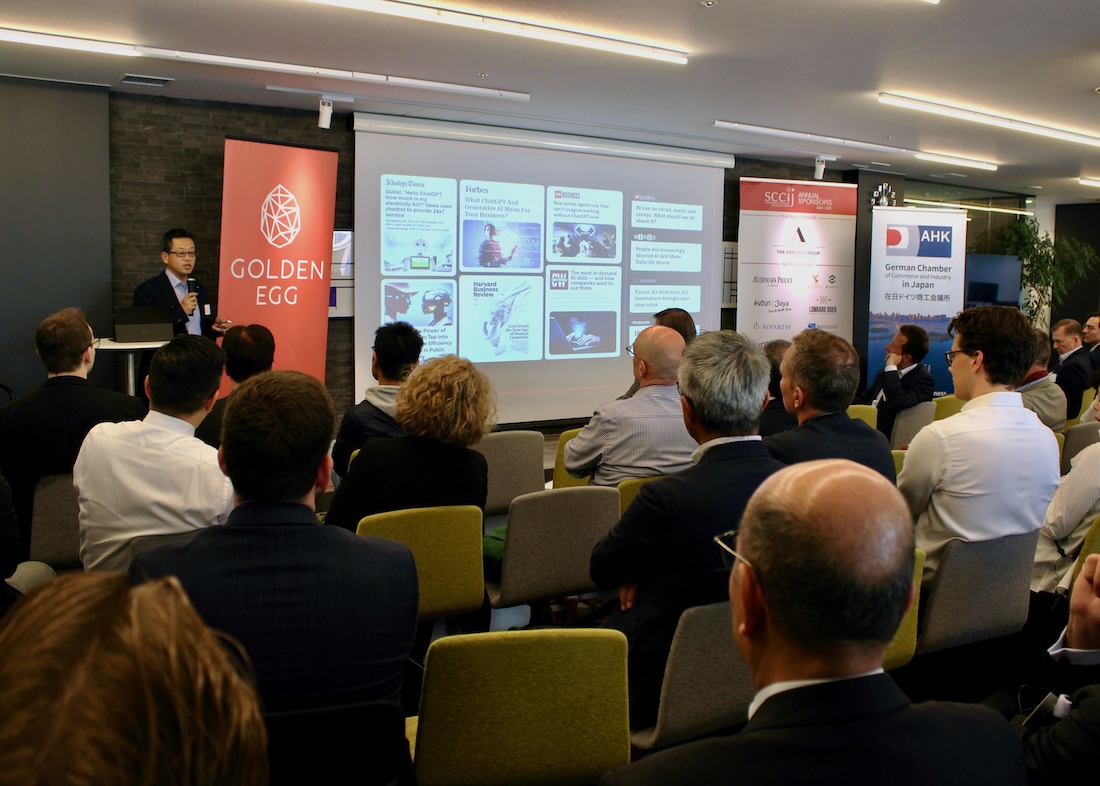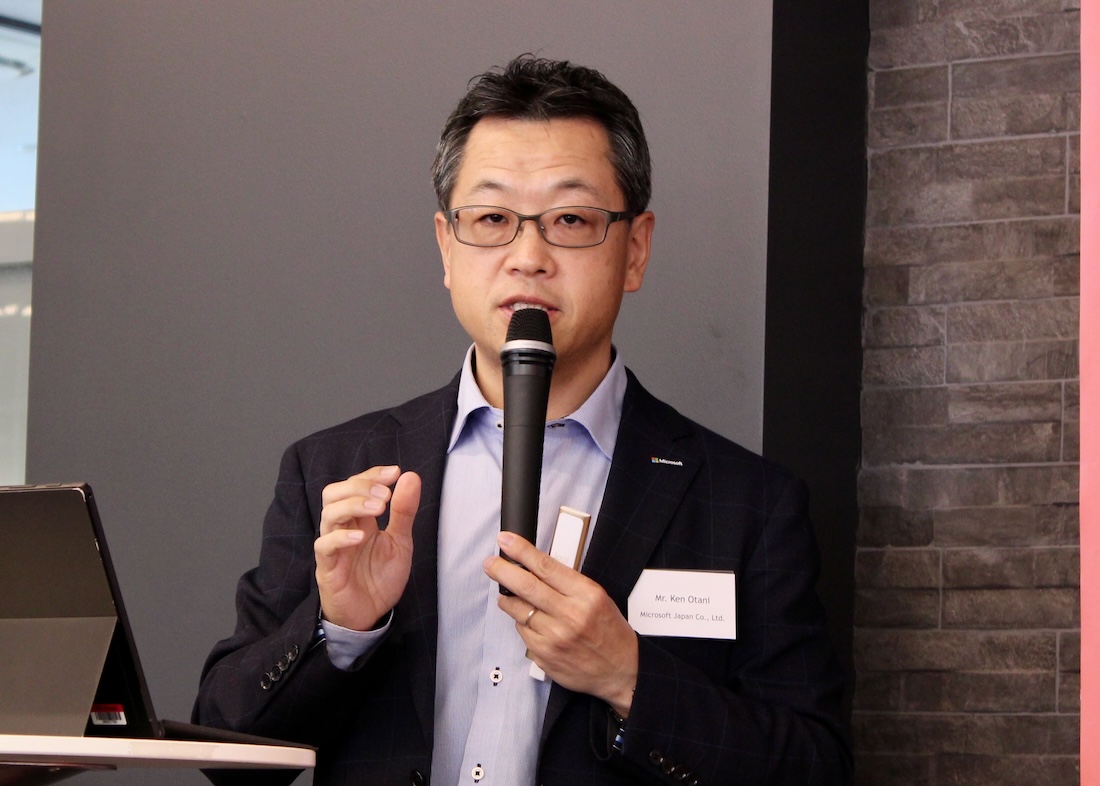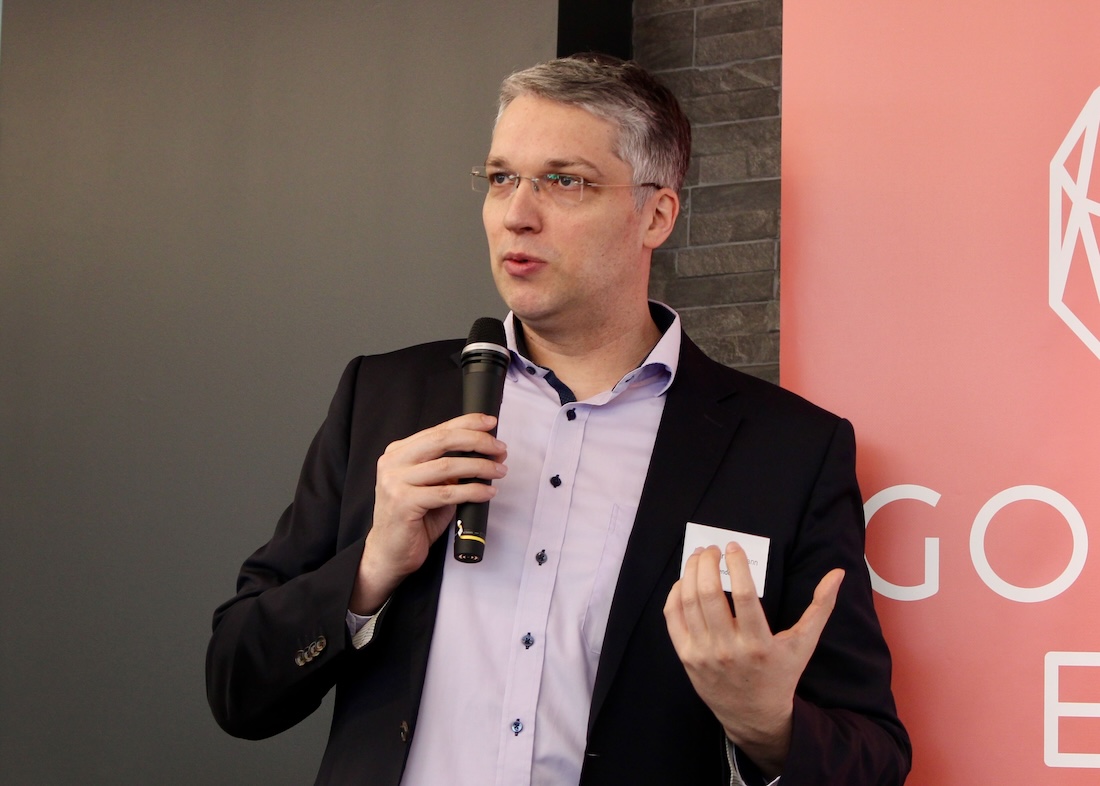Tokyo (SCCIJ) – The Swiss Chamber of Commerce and Industry in Japan, in collaboration with the German Chamber of Commerce and Industry in Japan (AHK Japan) and the Austrian Business Council (ABC), organized an Artificial Intelligence Summit featuring speakers from PwC, Microsoft Japan, and Ultra Tendency. We summarize the main talking points.

The Artificial Intelligence Summit organized by SCCIJ in collaboration with AHK Japan and ABC was held in Shibuya (©AHK Japan/David Haun).
Disruptive effects
Artificial intelligence will reshape and reinvent how companies across all industries run their businesses. In many instances it will have disruptive effects from daily operations, to production, engineering, research and development. This summit provided insights from three perspectives on the trends and opportunities as well as challenges and risks that can be seen with rising Artificial Intelligence applications in companies.

Speaker Mr. Shaun Willcocks, PwC Partner and Global Internal Audit Leader (©AHK Japan/David Haun).
Mr. Shaun Willcocks, PricewaterhouseCoopers Japan LLC Partner and PwC Global Internal Audit Leader, shared insights derived from the PwC Global Risk Survey. The core message: Technology is reshaping the perception of risk. According to the survey, business leaders perceive cyber as the biggest technological risk for their organisation; however, Mr. Willcocks notes that perhaps “the risk of doing nothing” might be considered a top risk when it comes to Generative AI (GenAI).
PwC defined the 5% of top-performing organisations in the survey as ‘risk pioneers’, seeing risk as an opportunity. In relation to GenAI, 60% of the companies saw it mostly or fully as an opportunity rather than risk. The survey also highlighted that whilst 95% of business leaders report adopting AI across the enterprise, only 37% have a strategy and policy to tackle AI risk, and only 48% have a formal process defining accountability around AI.
He continued: “At the same time, many organisations are still grappling with how they can reinvent themselves using this new technology. In the survey, we suggest five ways for companies to become a risk pioneer: Match tech ambition with action; put purpose at the heart of your risk strategy; fix the leadership disconnect; build a foundation of strategic resilience; and create a culture where diverse and bold thinkers can thrive.”
The speaker identified particular risks associated with Gen AI: “In contrast to traditional IT systems, AI can resemble a ‘black box’ because you might not know where its information comes from. Gen AI systems can, for example, “hallucinate” (create false “facts”). Companies need to determine what their own ‘risk appetite’ is when adopting AI. As part of the new risk landscape, there are also societal, market, and regulatory forces driving the need for a better approach to AI risk.”
“Several new legal frameworks for AI have already been introduced, for example, the new EU AI Act. PwC recommends its Responsible AI framework as one way to enhance end-to-end governance and help ensure there are no blind spots in the AI life-cycle. Business leaders should consider how AI will disrupt their business model (which is a strategic risk). Even with AI implemented, there will be many processes and activities that will still need a professional overlay and human judgement. This will also require people to be able to explain how they are using AI and be able to explain the risks. This includes, for example, system developers being able to show how data is used in AI systems and the chain of custody”.

Speaker Mr. Ken Otani, Azure Data & AI Lead at Microsoft Japan (©AHK Japan/David Haun).
Mr. Ken Otani, Azure Data & AI Lead at Microsoft Japan, provided insights into the latest trends and technologies in AI development. “There is no option for companies not to make use of Generative AI. Either you want to be part of the change or you are left behind. For every dollar a company invests in AI, it is realizing an average return of 3.5 dollars. It takes an average of 14 months to recover your AI investment if you pick the right use cases.”
Mr. Otani named four opportunities for the deployment of AI: “Enrich employee experiences; reinvent customer engagement; reshape business processes; and bend the curve of innovation. Gen AI can take over time-consuming work and gives responses to facilitate decisions. Gen AI itself does not make the decisions.
“There are three success factors for Gen AI”, Mr. Otani explained. “First, unlock your productivity with the “Copilot” of Microsoft. There is a free version online and it is integrated into the software package Microsoft 365 for businesses. The latter fully protects your private data – Microsoft does not use inputs and outputs to train its Gen AI models. Copilot works as your assistant. With the right prompts (commands), software developers can code 55% faster, domain experts can create workflows in half the time, knowledge workers can complete tasks 37% faster, and Copilot can reduce employee attrition by 20%.
Second, build your own AI model building your own Copilot with the Azure AI studio, Microsoft’s integrated AI toolchain that combines several large language models (LLM) beyond OpenAI’s ChatGPT. With Azure AI Studio, you can build and train your models, create prompt workflows, and retrieve augmented generation more easily. It comes with built-in AI Safety to safeguard your company data.” Mr. Otani named three application cases: Sompo Care uses its AI model to speed up the onboarding of new care workers, Pasona’s AI assistant produces resumes, and Preferred Robotics built an LLM for better communication with household robots.
“Third, safeguard your business and data. Microsoft has built-in AI safeguards for enterprises. One principle is that your data is your data. This means that your data is not used to train or enrich foundation AI models. Your data and AI models are also protected at every step. Our Copilot copyright commitment means that even if a copyright issue occurs, Microsoft will take responsibility for it.”

Speaker Mr. Robert Neumann, Founder and CEO of Ultra Tendency (©AHK Japan/David Haun).
Mr. Robert Neumann, Founder and CEO of Ultra Tendency, talked about the impact AI capabilities have on companies on a practical level and how companies may prepare their businesses and systems to quickly absorb new technologies to come. “As cloud and data natives our original mission was to make sense out of data. But as ChatGPT began changing the world, we created a new group company ‘ultra mAinds’ to focus on GenAI. The unit name and the logo have been created by AI.”
Mr. Neumann’s foremost recommendation: “If you want to understand AI in your company, you need to consider it not as a tool, but as a strategy. It is also not a one-off, but a game changer requiring continuous investment. It needs to be understood by top-level management and become a part of the budget. The potential lies in the improvement of efficiency, for example, 14% in marketing, 38% in customer operations, 30% in software engineering, and 12% in product R&D.”
“What is the new thing? Gen AI pretends to behave like a human, processes language and text, and creates audio and video. It took hundreds of millions of dollars to train ChatGPT. A start-up could not have done it. How do you find your GenAI strategy? In my opinion, the best start is the application of a commercial LLMaaS, a large language model as a service. The second option is the self-hosting of open-source models. For example, Ultra Tendency has developed a data chatbot based on OpenAI’s ChatGPT and Meta’s Llama 2. The third one is investing to build your model, but this only makes sense in a very limited number of use cases or companies.
Mr. Neumann added: “However, applying available commercial AI offers, such as Microsoft Copilot, should only be the start. Since everybody is using them, the competitive advantage is small. To gain an edge, companies should differentiate their use cases. There are more than 600,000 purpose-built models out there. Add your data to one or several of these models. Use retrieval-augmented generation (RAG) to add your company data to a model, then optimize the application in terms of performance and cost.”
“One such use case is information discovery. For example, today’s search engines for intranets are usually not very good at finding information. But by connecting all the various internal databases through building an RAG, the GenAI model gains access to all your company’s data. In such a case, data engineering is about 80% of the work, applying the Large Language Model (LLM) only about 20%.”
“A second example is customer interaction. While an operator in a call center listens to the request of a customer, an AI listens in the background, “comprehends” the problem, prompts potential solutions, and displays them on the agent’s screen. But beware: Applying AI for cost reasons is one thing, applying AI for strategic reasons would mean developing the best customer service in the world. Ultra Tendency can help identify and execute such a GenAI strategy, either through a discovery workshop, strategic AI consulting, or by building a specific solution.”
Text: Martin Fritz; Photos: ©AHK Japan/David Haun





























